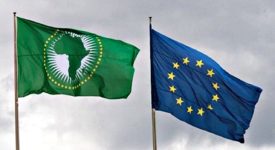As the global economic momentum shifts to Asia, European and American leaders have refocused attention on their continents through the negotiations for a comprehensive Transatlantic Trade and Investment Partnership (TTIP). Whilst Barack Obama’s announcement of imminent negotiations in the State of the Union Address of February 2013 seemed to surprise the media, a transatlantic free trade agreement (FTA) is an old story. Former EU Commissioner, Leon Brittan, spearheaded the attempts to create a Transatlantic FTA, with the 1995 New Transatlantic Agenda, with an economic pillar aimed at creating a Transatlantic Marketplace by removing barriers to trade in goods and services. After continued insistence by the Transatlantic Business Forum, created in the New Transatlantic Agenda, the parties agreed to a New Economic Partnership in 1998, which included agreements to ‘mutual recognition’ of standards in various sectors, thus eliminating the need to duplicate tests on each side of the Atlantic, but failed to create the marketplace.
Nearly 20 years later, the idea of a Transatlantic FTA has gathered force again with greater momentum. So what is different this time? In the late 1990s, the EU hoped for a successful round of World Trade Organisation (WTO) negotiations, and placed a greater emphasis on multilateral liberalisation. Between 1999 and 2004, when Pascal Lamy was Trade Commissioner, he even imposed a moratorium on FTAs to support WTO negotiations. In the U.S., after the creation of NAFTA in 1994, Congress again fell into discrepancies over trade liberalisation, and, that year Presidential fast-track Trade Promotion Authority, which facilitates negotiations with partners by limiting Congress’s role to an up or down vote on the agreement, expired. President George W. Bush was granted it between 2002 and 2007, and President Obama is now intent on regaining it. In 2013, the U.S. and EU appear much more focused on trade negotiations, not only have they just engaged in the second round of TTIP negotiations (Brussels, 7-11 October 2013), but in the interim years both have negotiated a host of new comprehensive FTAs with third parties.
This is largely due to their shared broad view of economic liberalisation and global trade governance. Both have been advocates of inclusion in the WTO of issues that hamper trade and investment, yet go beyond strict definitions of trade. They proposed liberalising trade in services; eliminating nontariff barriers in the form of standards, testing procedures and domestic regulations; opening public procurement processes to foreign companies; stronger intellectual property rights regulations; and harmonised competition policies. These so-called ‘Singapore issues’ – after the WTO Ministerial meeting where they were first mooted – have been actively opposed by emerging and developing states. The later fear the encroachment of binding rules on these matters on their future domestic policy space. Moreover, they argue that the approach is aimed at protecting Western advantages in the services, technology and creative sectors.
By extending beyond its traditional domain into matters of domestic regulation, the WTO Doha Development Round has reached near-paralysis. At the 2005 Hong Kong Ministerial Meeting, the parties agreed to drop most of the ‘Singapore issues’ from the agenda. Since then the EU has been pursuing the ‘Singapore issues’ through bilateral FTAs, and the U.S. commenced its own FTA agenda even earlier, in the early 2000s. Despite agreements in Latin America and with Singapore and South Korea, other partners are expressing the same doubts they voiced at the WTO over EU and U.S. comprehensive FTAs (e.g. EU-India FTA or Trans-Pacific Partnership negotiations).
A Transatlantic regulatory space that encompasses almost half of global trade could, in practice, set the global standard for economic and regulatory governance, by raising the cost of being outside this system. In this sense, TTIP can be viewed as an attempt to preserve and extend a preferred model of regulatory governance and liberalisation. However, despite the shared vision, the devil will be in the detail. Decades of Transatlantic cooperation have failed to resolve outstanding differences over the regulation of genetically-modified organisms or the use of geographic indicators in wines, spirits and agricultural products amongst others, so it is unlikely that these will be solved rapidly. Negotiators on both sides have shown a remarkable commitment to TTIP this year and to the aim of delivering an agreement by late 2014 – though it remains to be seen how talks proceed.
………………………………
Article Tags:
Asia · Barack Obama · Brussels · EU · FTA · George W. Bush · Hong Kong · Korea · Leon Brittan · Pascal Lamy · Singapore · TTIP · WTO






